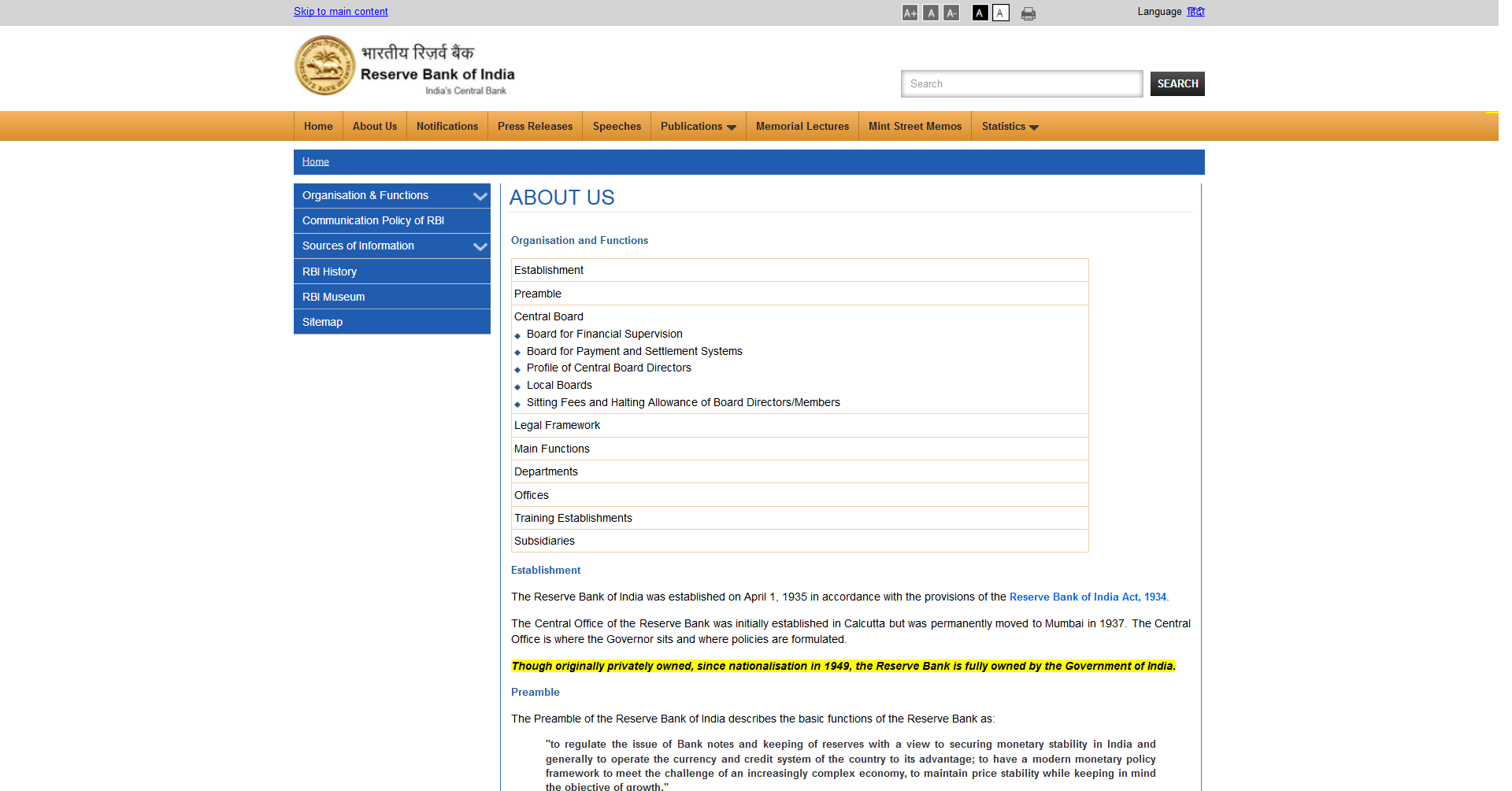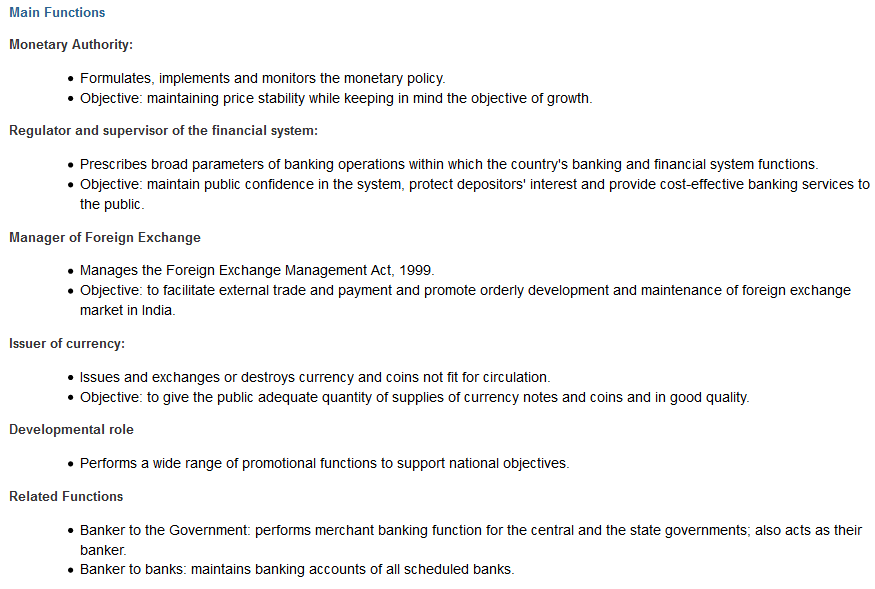The RBI vs. Government battle is intensifying. The Narendra Modi government intends to keep pressing demands for the country’s central bank to relax lending curbs and hand over surplus reserves, amounting to whopping 3.6 lakh crore, even if it risks provoking a resignation by the bank’s governor. After the debacle of demonetization and GST, the Modi government is struggling to handle the economy of India. Modi’s pet projects require huge sums of resources, which only RBI can provide. It is thus important for the Modi government, who is desperate to win the reelection next year, to gain full control of the RBI. This battle has brought some important issues in open that I want to discuss here.
Who owns the RBI?
RBI’s deputy governor Viral Acharya started this war by saying that undermining central bank independence could be “potentially catastrophic”. The finance minister of India then fired back and since then the pressure is mounting on RBI. In all these back and forth arguments, the crucial issue that Indians must think about carefully is, who owns the RBI? Is RBI truly an independent and autonomous institution as the deputy governor is saying? The answer of this question can be found on RBI’s website itself. Below is the screenshot (see figure 1) taken from RBI’s website “About Us” section. I quote the relevant paragraph,
Though originally privately owned, since nationalisation in 1949, the Reserve Bank is fully owned by the Government of India.

As one can see, the RBI itself is admitting that it is fully owned by the Government of India. This means, the whole idea of RBI as an independent and autonomous monetary institution is bogus and a propaganda being perpetuated by the authorities to keep the public in dark about its functioning. The whole concept that the money supply in India is being managed by so-called professionals and so we should not worry about it goes right out of window with the revelation of this truth. If RBI is owned by the government then surely it is not determining monetary policy independently. It is just fulfilling wishes of its master government since 1949. The idea of its autonomy is just a cover to hide this fact.
So how does the RBI fulfills wises of its master government?
What does the RBI do?
RBI’s website lists its major functions (see figure 2). The consequences of RBI’s actions are very severe on the Indian economy. They are mainly following:
- Its interest rate manipulation results into the boom and bust cycles into the economy which creates total havoc by skewing the capital and production structure of the Indian economy and lowering our future income.
- It lowers the purchasing power of Indian currency rupee (inflation), which makes all of us poor year after year.
- Its easy money policy results into widening income and wealth inequality in the country viz., the Cantillon effect.

What should be done about the RBI?
Looking at all the dangerous effects of RBI’s functioning it is desirable that the Modi government dismantles it and takes over the control of managing supply of rupee in its own hands.
One immediate effect of the dismantling of the RBI will be that the time market, which sets the rate of interest, can now work freely without any interference of the RBI. With the end of RBI’s interest rate manipulation, the business cycles will end in India. This way the Indian economy will be spared of the damage done to its capital and production structure. In the absence of interest rate manipulation the economy can now grow at its natural pace as determined by the societal time preference i.e., decision of Indians to either consume in present or save and invest in future.
Also, Inflation will now become much more visible. Visible because when RBI creates rupees out of thin air, i.e., prints notes, it does it in a clandestine and indirect way via government bond purchases viz., the open market operation (OMO). But when the government will create rupees out of thin air by simply printing it everyone will come to know who is responsible for creating inflation in the economy. The fear of price inflation will keep the governments in check. Governments will be forced to either balance their budgets or go out of power. This will lower their interference in the economy and our lives.
Conclusion
The on-going battle between the RBI vs. Government is a good chance for the Indians to think carefully about the role of the central bank in India. Central banks are very secretive institutions whose ugly impact on our lives is difficult to imagine for most people. Since their inception they have only done damage to all of us. It is better for all of us that the RBI be dismantled, and if the Modi government does that then we should not stop them.

Firstly kudos to the wonderful article which carefully methodically illustrates the causes and effects whilst also correctly providing the only solution (which would make the followers of Austrian Economics cry with joy) for a country run by central banks . However, I would humbly like to put forth my 2 cents as a critique.
The FM will never on the face of it like to take total control of RBI, subtly though yes, The creation of MPC is one way of it. By assuming the Govt would do the right thing and allow markets to function freely is impossible !. Infact i believe the FM could easily give Robert Mugabe a run for his money with draconian policies.
What FM will like to do is only the FM knows. I am saying that, if he wants to dismantle RBI and take over the control of money printing in his own hands then we should not stop him. Everyone right now is venerating the RBI and portraying as if it is some mythical autonomous institution that is the savior of the Indian economy. Nothing can be further from the truth. It is one institution that has done immense damage to the Indian economy. It must be exposed. It must be the main target of all people who love this country. I am saying that, instead of RBI if government directly prints rupees then it will be relatively better than RBI doing it indirectly in any case. Government will be much more constrained. And most importantly, as I said in the article too, we can finally get rid of the business cycle which results because of RBI interest rate manipulation.
I doubt any government can pull Zimbabwe here. Politicians love to get elected and reelected so the chances of Zimbabwe happening in India is very slim. Again, what is possible and impossible I am not discussing in my article. I am just presenting the alternative scenario.
Pingback: RBI Governor Dr. Urjit Patel Resigns – Mises India